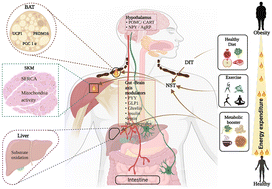Recent advancements in pharmacological strategies to modulate energy balance for combating obesity
Abstract
The prevalence of obesity along with its related metabolic diseases has increased globally in recent decades. Obesity originates from a heterogeneous physiological state, which is further complicated by the influence of factors such as genetic, behavioural, and environmental. Lifestyle interventions including exercise and diet have limited success, necessitating the development of pharmacological approaches. Mechanistically, strategies target either reducing energy intake or increasing consumption through metabolism boosting. Current drugs lower energy intake via inducing satiety or inhibiting substrate absorption, while targeting mitochondria or cytosolic energy sensors has shown limited success due to toxicity. Nonshivering thermogenesis (NST) has provided hope for activating these processes selectively without significant side effects. The internet-based marketing of plant-based formulations for enhancing metabolism has surged. This review compiles scientific articles, magazines, newspapers, and online resources on anti-obesity drug development. Combination therapy of metabolic boosters and established anti-obesity compounds appears to be a promising future approach that requires further research.



 Please wait while we load your content...
Please wait while we load your content...